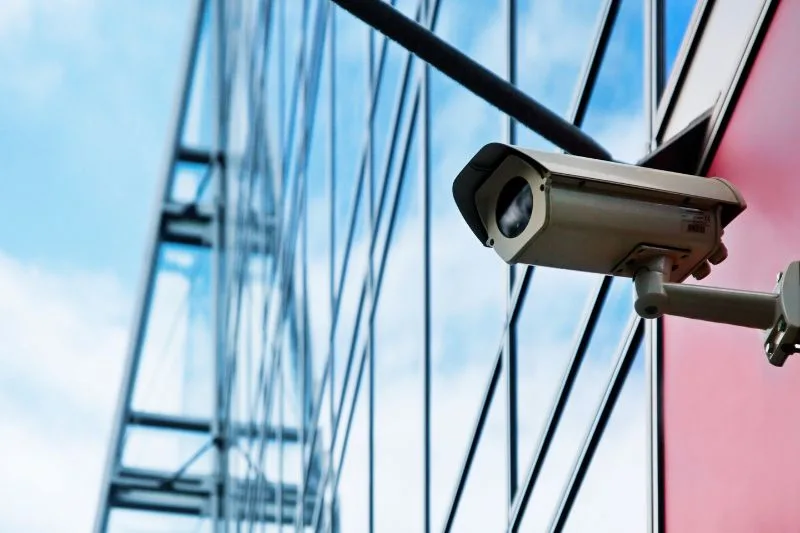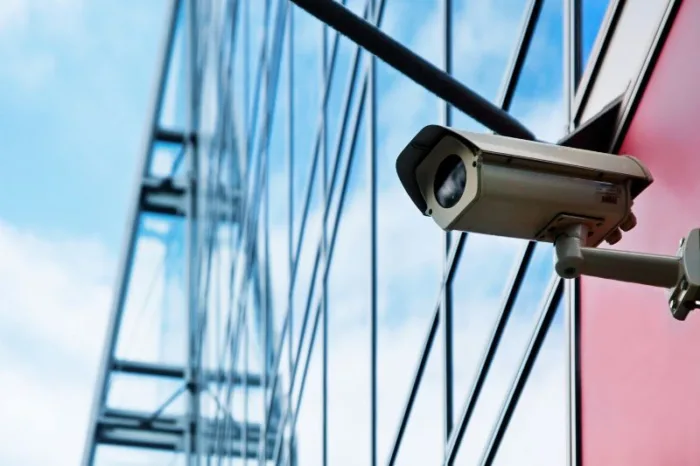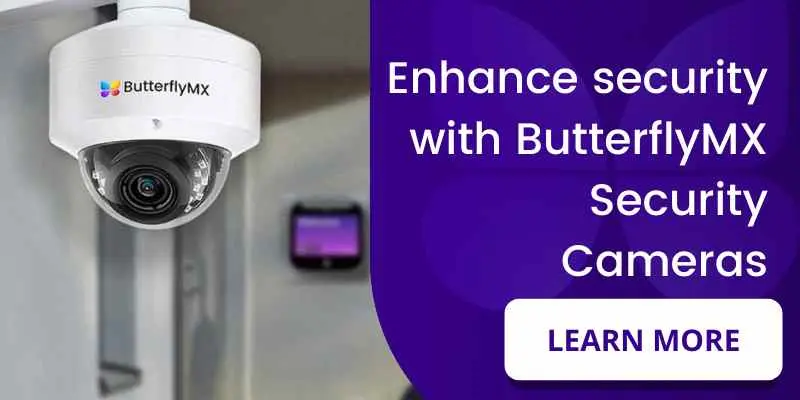Key takeaways
- A commercial IP camera, or Internet Protocol camera, is a digital video camera that sends and receives data over a network, such as the internet.
- With strategically placed IP cameras, you can gain useful insights and maintain clarity about daily operations.
- IP cameras can use either wired ethernet connections or WiFi, offering greater flexibility.

When it comes to gaining property insights, monitoring operations, and ensuring employee safety, finding the right access control and security cameras is critical. Now, commercial IP cameras have emerged as a key solution to these challenges, offering advanced features that go beyond traditional security measures.
In this comprehensive guide, we’ll explore commercial IP cameras, including top brands and their features. We’ll also delve into various use cases, explain how to integrate these cameras with top access control systems, and answer some common questions about IP cameras.
In this post, discover:
- The best commercial IP camera brand to buy
- What are commercial IP cameras?
- Commercial IP camera use cases
- How to integrate commercial IP cameras with ButterflyMX access control
- Commercial IP camera FAQs
The best commercial IP camera brand to buy
Here are the best IP camera brands on the market:
1. ButterflyMX
ButterflyMX is renowned for its innovative approach to security, particularly in multifamily and commercial properties.
Here are the top features that make ButterflyMX Cameras a standout choice:
- Seamless integration with access control. ButterflyMX Security Cameras are designed to integrate seamlessly with our Access Control Systems for a cohesive access and security experience. Full-system integration allows property managers and residents to view live camera video and link camera footage with access events, making it easier to track who is entering and leaving the property.
- High-definition video. ButterflyMX Cameras offer high-definition video quality, ensuring that all footage is clear and detailed. HD video is crucial for identifying individuals and capturing essential details in case of an incident, which also makes these cameras effective for both security and monitoring purposes.
- Cloud storage and remote access. One of the key advantages of ButterflyMX Security Cameras is their cloud-based storage solution which allows users to access recorded footage from anywhere, at any time, using a secure internet connection. ButterflyMX cloud storage also ensures that important video data is protected from physical damage or theft, and is stored for up to seven days.
- Two-way audio. The two-way audio feature allows users to communicate with visitors or potential intruders directly through the camera. This feature is especially useful in multi-tenant buildings, where residents or property managers can interact with delivery personnel, guests, or service providers without having to be physically present.
- High durability. ButterflyMX Cameras are highly durable with weather and impact-resistant casing. This high-durability makes them perfect for all kinds of commercial spaces, including indoor and outdoor areas.
Watch how ButterflyMX works:
2. Lorex
Lorex is a well-known name in the security camera industry, offering a wide range of products suitable for both residential and commercial use.
Here are the top features of Lorex cameras:
- 4K Ultra HD. Lorex cameras are known for their exceptional video quality, with many models offering 4K Ultra HD resolution. High levels of detail are crucial for identifying faces, license plates, and other important visual information, making it a top choice for businesses that require high-security standards.
- Night vision capabilities. Lorex cameras come equipped with advanced night vision technology, allowing for clear visibility even in complete darkness. Their infrared LEDs can illuminate areas up to 150 feet away, making them ideal for monitoring large outdoor spaces like parking lots or building perimeters.
- Weatherproof design. One of Lorex’s standout features is the durability of its outdoor cameras. Designed to withstand harsh weather conditions, these cameras are IP67-rated, meaning they are resistant to dust and water.
- Wide field of view. Lorex cameras often feature wide-angle lenses, providing a broader field of view. This means fewer cameras are needed to cover a large area, reducing overall costs and simplifying the security setup. This feature is particularly beneficial for large commercial properties.
- Remote viewing. Lorex offers a user-friendly mobile app that allows remote viewing of live and recorded footage. The app is compatible with both Android and iOS devices, enabling users to monitor their property from anywhere in the world.
3. eufy
eufy Security has gained popularity for its affordable yet feature-rich security cameras.
Here are the top features of the eufy Security:
- Local storage. One of the standout features of eufy Security cameras is their focus on local storage. Unlike many competitors that rely on cloud storage and charge monthly fees, eufy offers local storage options without additional costs.
- High-definition video. eufy Security cameras deliver clear and sharp video footage, with many models offering 1080p or even 2K resolution, ensuring that all recorded footage is detailed, making it easier to identify people and objects.
- AI. Cameras from eufy are equipped with AI-powered human detection, which minimizes false alarms by distinguishing between human movement and other motion triggers like pets or passing cars.
- Easy Installation. eufy Security cameras are designed with user-friendliness in mind, featuring easy installation processes and wireless designs. What’s more, many of their cameras are battery-powered, eliminating the need for complex wiring and making them easy to install in both indoor and outdoor locations.
4. Wyze
Wyze is a brand that has made a name for itself by offering affordable security cameras without compromising on quality.
Here are the top features of Wyze security cameras:
- Pricing. Wyze cameras are known for their affordability, making them accessible to a wide range of users, from homeowners to small businesses. Despite the low price point, Wyze cameras offer a robust set of features, providing excellent value for money.
- 1080p full HD. Wyze cameras offer 1080p full HD video quality, ensuring clear and crisp footage. This high resolution is more than sufficient for most security needs, whether you’re monitoring an office space or a retail store.
- Motion and sound detection. Wyze cameras are equipped with both motion and sound detection capabilities. The cameras can send instant alerts to your smartphone when motion or unusual sounds are detected, allowing for real-time monitoring and quick responses to potential security threats.
5. Arlo
Arlo is a premium brand known for its high-quality security cameras that cater to both residential and commercial users.
Here are the top features that make Arlo cameras a top choice:
- 4K video. Arlo cameras are renowned for their top-tier video quality, with many models offering 4K Ultra HD resolution. This level of detail is essential for identifying faces, license plates, and other critical details, making Arlo cameras ideal for high-security environments.
- Wireless. Arlo cameras are completely wireless and run on rechargeable batteries, which makes installation incredibly flexible. However, many people find that cameras connected by Power-over-Ethernet wires are more reliable.
- AI detection. Lastly, Arlo cameras come equipped with advanced AI features, including human, vehicle, and package detection. AI detection technology can reduce false alarms and ensure that users are notified of relevant events. What’s more, the smart detection capabilities may make Arlo cameras suitable for commercial settings where accurate monitoring is crucial.
What are commercial IP cameras?
A commercial IP camera, or Internet Protocol camera, is a digital video camera that sends and receives data over a network, such as the internet. Unlike traditional analog cameras that rely on a direct connection to a recording device, IP cameras transmit video footage via an IP network, allowing for greater flexibility in installation and access.
Key features of commercial IP security cameras:
- High-resolution video. IP cameras offer superior image quality, often with resolutions up to 4K, ensuring clear and detailed footage. This is crucial for identifying faces, license plates, and other important details in a commercial setting.
- Remote accessibility. With IP cameras, you can monitor your business premises from anywhere in the world. The top brands provide mobile apps and web interfaces that enable real-time viewing and playback of recorded footage, offering peace of mind even when you’re off-site.
- Scalability. IP cameras are highly scalable, making it easy to expand your security system as your business grows. They can integrate seamlessly with existing IT infrastructure, reducing the need for specialized cabling.
Commercial IP security camera use cases
Commercial IP security cameras are versatile tools that cater to various needs beyond basic security. With strategically placed IP cameras, you can gain useful insights and maintain clarity about daily operations.
Here are some more common use cases for commercial IP cameras:
- Monitoring entry and exit events
- Gaining traffic insights at parking garages and gates
- Keeping a clear view of on-site movement
- Remotely viewing deliveries and package drop-offs
- Monitoring hallways, stairwells, and other hard-to-view areas
How to integrate commercial IP cameras with ButterflyMX Access Control
Integrating IP cameras with an access control system like ButterflyMX enhances your business’s security by providing a comprehensive monitoring solution.
How to integrate your IP camera with ButterflyMX:
- Ensure compatibility. Start by choosing IP cameras that are ONVIF compatible. Or, choose from one of the Bullet or Dome Security Cameras ButterflyMX offers, which are designed to integrate seamlessly with our Access Control System.
- Network configuration. Proper network configuration is crucial for smooth communication between devices. Both the IP cameras and ButterflyMX should be connected to the same network using the ButterflyMX Gateway.
- Software integration. Use the ButterflyMX app or web interface to link your IP cameras with the access control system. This integration allows you to view live feeds from the cameras, verify visitor identities, and control access remotely.
- Review access events or view live feeds. Finally, start viewing live video feeds of cameras throughout your property or review the audit log, which showcases footage tethered to access events. This makes it easier and faster to review activity occurring at your property.
Commercial IP camera FAQs
- What is the difference between IP cameras and security cameras?
- Which is better: WiFi camera or IP camera?
- Which is better: IP camera or DVR?
What is the difference between IP cameras and security cameras?
The terms “IP camera” and “security camera” are often used interchangeably, but they have distinct meanings:
- IP cameras. These are digital cameras that transmit video over a network. They offer higher resolution, remote access, and advanced features like motion detection, night vision, and cloud storage. IP cameras are a type of security camera, but not all security cameras are IP cameras.
- Security cameras. This is a broader term that includes all types of cameras used for security purposes, including both analog and digital models. Traditional analog cameras transmit video over coaxial cables and are typically connected to a DVR (Digital Video Recorder) system. They are generally less expensive but offer lower resolution and fewer features compared to IP cameras.
Which is better: WiFi camera or IP camera?
IP cameras can use either wired ethernet connections or WiFi, offering greater flexibility. They support higher resolutions, provide more secure connections, and can handle complex configurations, making them ideal for larger commercial properties. For businesses requiring robust security, IP cameras are the better choice.
On the other hand, WiFi cameras connect to the network wirelessly, making them easy to install without extensive wiring. They are suitable for small businesses or home offices where wiring may be challenging. However, WiFi cameras can be susceptible to interference, have a limited range, and may struggle with bandwidth issues in large environments.
Which is better: IP camera or DVR?
IP cameras offer higher resolution, easier installation, and advanced features. They store footage on NVRs (Network Video Recorders) or in the cloud, providing more flexible storage options and easier access to recordings. For most modern commercial applications, IP cameras are the superior choice due to their image quality, scalability, and integration capabilities.
DVR systems are typically used with analog cameras. They record video footage and store it on a hard drive. While DVR systems are cost-effective, they offer lower resolution and require separate cabling for video and power, which can complicate installation and maintenance.

Learn more about ButterflyMX
Fill in the form below, and we'll email you right back.
Have questions?
Fill in the form below, and we'll email you right back.







